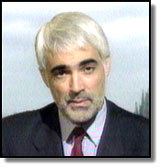
|
Interest Rate Hike to Control InflationInterest rates have gone up again for the third time in as many months, with the Bank of England raising them by 0.25 per cent.A leading mortgage lender, Abbey National, has already put up the cost of home loans by a smilar amount and other lenders are expected to follow suit. The decision to put up rates follows last month's higher than expected increase in inflation. The Chancellor, Gordon Brown, has defended the rate hike, insisting the Bank had taken action to bring inflationary pressure under control. "By taking tough action now to bring both the deficit down and to bring inflation down, the Government and the Bank of England are determined to ensure that this country does not return to the instability and the negative equity of the Conservative years," he told the Commons.
But Peter Lilley, the Shadow Chancellor, said Mr Brown had only himself to blame for the interest rate rise. The Chancellor had not taxed consumer spending, but pension funds. So if there was a consumer boom feeding inflation, then Mr Brown had taken the wrong measures to combat it.
The Liberal Democrat's Treasury spokesman, Malcolm Bruce, said the interest rate rise was the "clearest possible signal" that the Budget had failed to dampen the consumer boom. He predicted that this was the week in which "Labour's honeymoon" with the voters ended.
Good for Savers, Bad for Exporters
The Bank's move is welcome news for savers, but it does push up mortgage costs for millions of home owners as well. The rise could put around £10 a month on the cost of an average £50,000 mortgage. Worst hit, however, are exporters who are already complaining about the strength of the Pound Sterling. The Confederation of British Industry (CBI) said British business "reluctantly accepts" the need for the rise, and former Chancellor Norman Lamont commented that the Bank should not be criticised for taking "difficult decisions". During the past week, speculators on the currency markets had gambled billions of pounds that interest rates would rise. Economists were convinced that the Bank of England would think that last week's Budget did little to curb consumer spending, which is growing at its fastest rate since the eighties. Experts say that the Bank tries to ensure that the spending spree does not lead to inflation, and it can only do that by putting rates up.
|
Diana, Princess of Wales, 1961-1997
Conference 97
Devolution
The Archive
News |
Issues |
Background |
Parties |
Analysis |
TV/Radio/Web
Interactive |
Forum |
Live |
About This Site
News |
Issues |
Background |
Parties |
Analysis |
TV/Radio/Web
Interactive |
Forum |
Live |
About This Site
© BBC 1997 |
politics97@bbc.co.uk |


